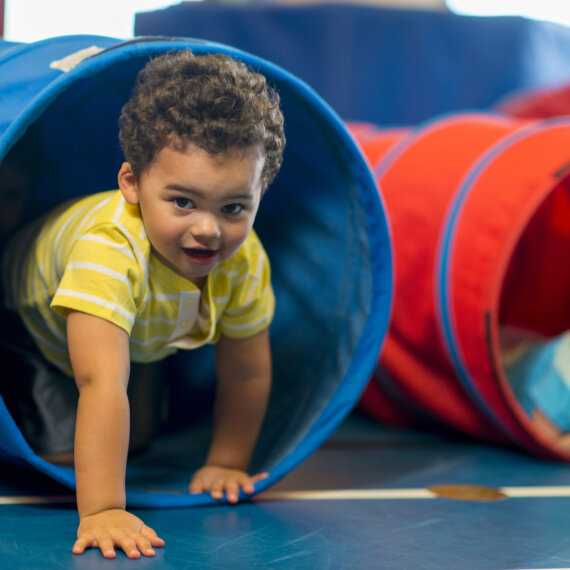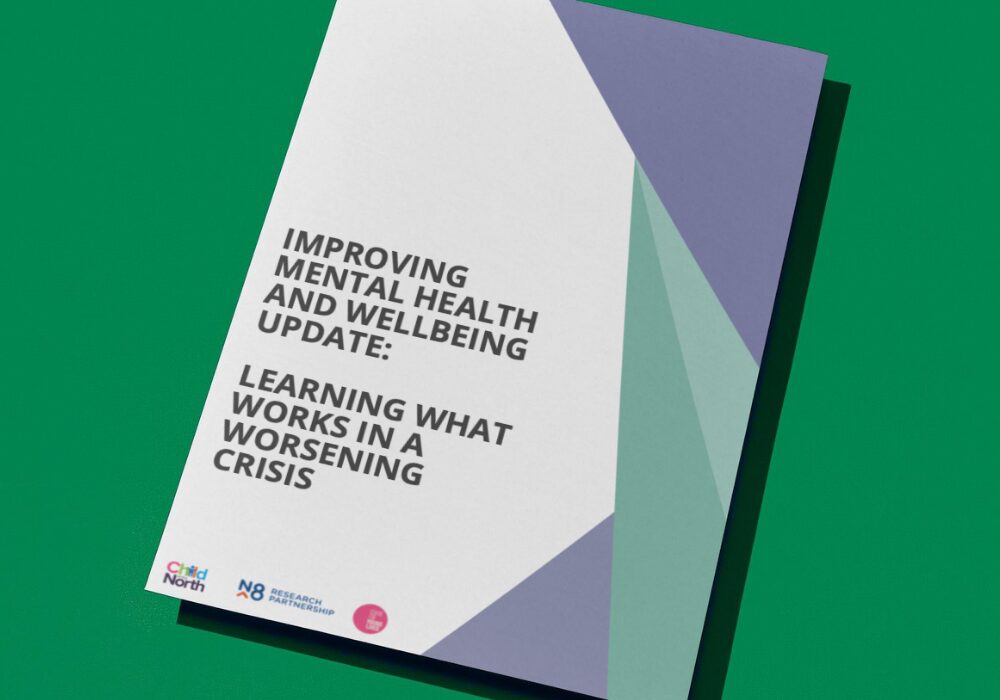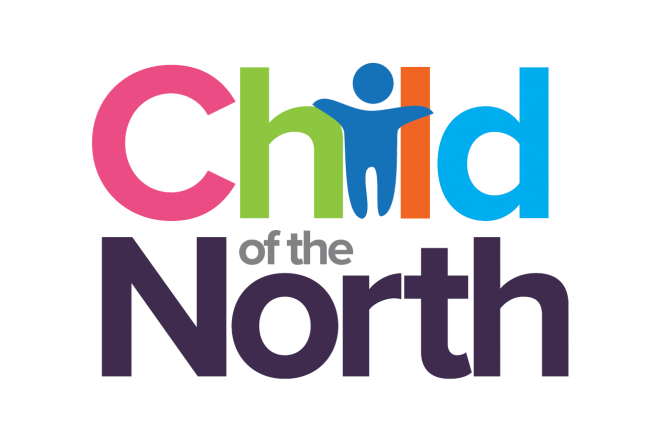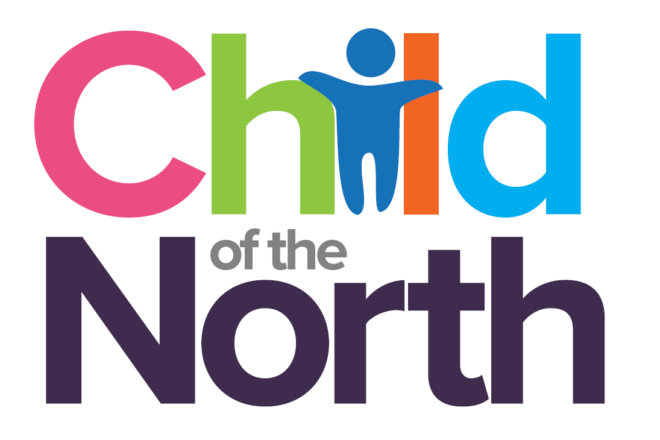Improving mental health and wellbeing with and through educational settings
For a country that works for all children and young people
We are calling on the government to put children first. Our 2024 report series provides evidence-based plans and recommendations on how to improve outcomes for children and young people in the North of England and beyond. Published alongside 2025 report updates, new practitioner toolkits have been designed to support schools, child health services, and local authorities to implement the report recommendations and put children first. #ChildrenFirst
In 2024, Child of the North and Centre for Young Lives initiated a major campaign calling on the government to build a country that works for all children and young people. This campaign delivered a series of reports and webinars on twelve key topics identified by Northern child health leaders as major issues of concern, including poverty, special educational needs, school attendance and mental health. These reports provide rigorous research and pragmatic, evidence-based recommendations.
First published in April 2024, the third report, Improving mental health and wellbeing with and through educational settings came amid a national epidemic of children’s mental health problems. The report set out a new plan for Government to boost children’s mental health through schools. With children spending more time in school than in any other formal institutional structure, educational settings provide the ideal opportunity to reach large numbers of children simultaneously and can also facilitate intervention with pupils displaying early mental health or behavioural symptoms.
An update, Improving mental health and wellbeing update: Learning what works in a worsening crisis, released in September 2025, forms part of the #ChildrenFirst campaign, drawing attention back to the issues highlighted in the series, and providing a series of toolkits designed to support schools, child health services and local authorities to implement the report recommendations and improve outcomes for all children.
We need the government, policymakers, practitioners, academics, communities and young people to work together to build a country that works for all children and young people.
Support our 2025 #ChildrenFirst campaign, by sharing the resources below:
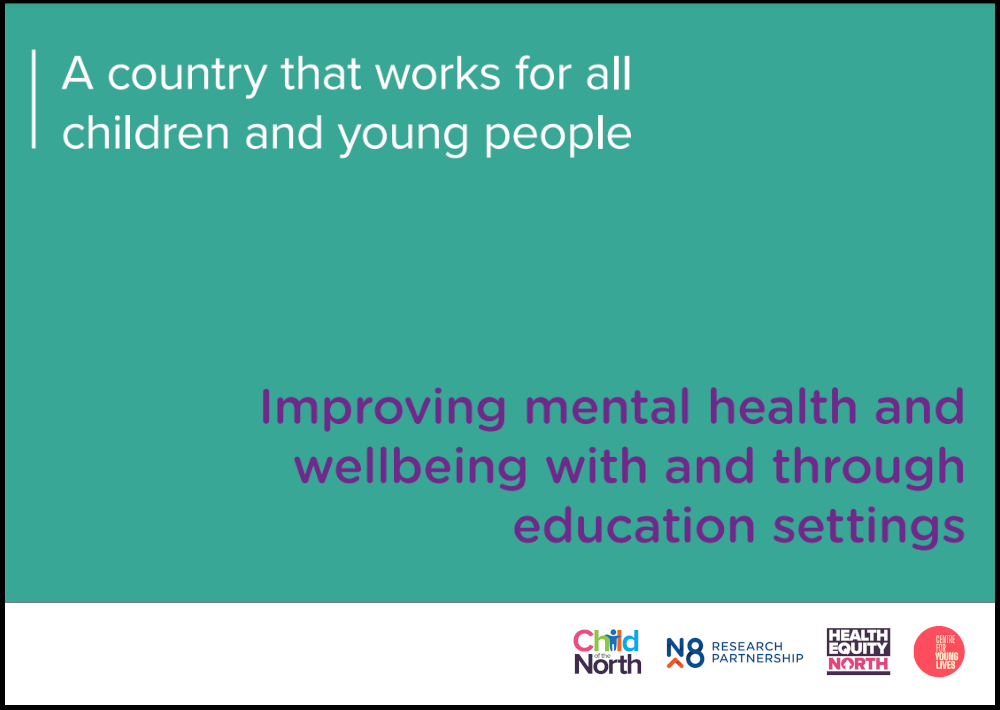 |
Improving mental health and wellbeing with and through educational settingsPublished April 2024, as the third report in our twelve-part series Our analysis reveals that:
|
Report insights
The report calls for:
- An expansion of the mental health support offered through schools and educational settings, starting in the primary school years, to all schools.
- The creation of a network of ‘one stop shop’ local online NHS information hubs, based on NHS Healthier Together, to signpost children and families to appropriate local mental health support where it is available.
- Harnessing the power of digital technology in a way that benefits the mental health of children by rolling out school-based research surveys like the existing #BeeWell and Age of Wonder projects nationally.
- Tackling of the upstream determinants of poor mental health, including early support for neurodivergent children. The Government’s strategy to improve the social and emotional wellbeing of young people should include a focus on the pre-school and primary school years.
- Addressing the workforce crisis in educational psychology provision, to encourage a larger number of graduate psychologists to support schools, alongside teacher training and career development that equips staff to create classroom environments that promote pupil wellbeing and support the mental health needs of pupils.
To highlight the scale of mental health problems among young people, the report also includes preliminary data gathered from 5,000 children and young people in Bradford that reveals the shocking rise of eating disorders in the area, including:
- One in five (21%) of Year 9 pupils in Bradford reporting a probable eating disorder.
- 18% of 12-to-15-year-olds in Bradford reporting symptoms indicative of a probable eating disorder (the national rate among 11-to-16-year-olds is 13%).
- 17% of 12-to-15-year-olds reported self-harm in the last 12 months, with a higher prevalence in girls (20%) compared to boys (13%).
The report also highlights two priority issues raised by children and young people in Bradford as detrimental to their mental health – problems with lack of sleep and with loneliness. These findings are seen elsewhere. A recent #BeeWell survey examined the relationship between sleep quality in approximately 35,000 young people in more than 150 schools across Greater Manchester. #BeeWell found that more than four in ten young people reported not getting enough sleep.
How To Guides
A series of toolkits have been developed to help practitioners and organisations take practical steps to improve the health and wellbeing of the children and young people with whom they work directly. Building on the findings of the Child of the North reports, these ‘How To’ guides provide evidence and suggestions about how all parties can work together.
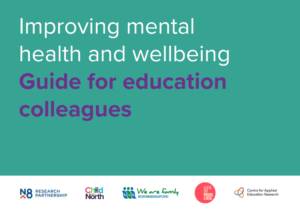 |
Published September 2025
Improving mental health and wellbeing – Guide for education colleagues |
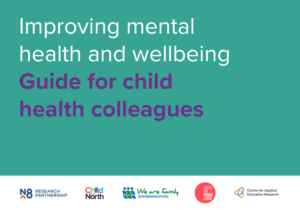 |
Published September 2025
Improving mental health and wellbeing – Guide for child health colleagues |
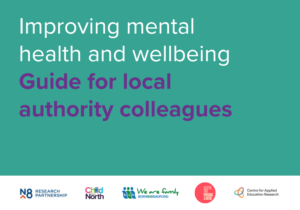 |
Published September 2025
Improving mental health and wellbeing – Guide for local authority colleagues |
Webinar
In May 2024 a number of the report’s authors came together to discuss their findings and to answer audience questions, you can watch the YouTube recording below. The webinar participants included:
- Professor Mark Mon-Williams – University of Leeds
- Professor Neil Humphrey – University of Manchester
- Professor Cathy Creswell – University of Oxford
- Dr Ruth Wadman – University of York / BiB Age of Wonder
- Olivia Taylor – University of York / BiB Age of Wonder
Anne Longfield, Executive Chair of the Centre for Young Lives, said:
“As an anchor in children’s lives, schools have a crucial role to play in supporting children’s mental health and wellbeing. Yet half of the school age children in England – four million children – will not have access to Mental Health Support Teams under current plans. We need to rocket-boost support in schools if we hope to bring down the numbers of children who are struggling with mental health problems.
“At the next election, the parties will put forward their proposals for improving children’s mental health. Labour has already pledged to recruit more staff, introduce specialist mental health support for children in every school, and deliver an open access children and young people’s mental health hub for every community. But there should be a cross-party ambition to reduce the prevalence of children’s mental health conditions by half over the next 10 years, and all politicians should agree that the current system is failing too many children and needs urgent attention.”
Professor Mark Mon Williams, Child of the North report series editor, said:
“There is no better measure of the health of a nation than the mental wellbeing of its children and young people. The statistics on mental health in children are heartbreaking and demand immediate action. The UK must prioritise the mental health and wellbeing of its children and young people if it wants to enjoy long-term prosperity. This report shows how the next Government could and should invest in the UK’s future wellbeing.”
Dr Ruth Wadman, Research Fellow for the Age of Wonder Adolescent Mental Health Collaboratory, said:
“Our children and young people need good mental health and wellbeing to develop and flourish. There is an urgent need to step up our efforts to prevent mental health conditions and to intervene early when they emerge. The report shows that schools can play a key role in promoting good mental health and wellbeing, both by harnessing the power of data and by listening to children and young people.”
Sign up for updates on our 2024/25 Campaign
We will only use this data for the purposes of providing updates on the Child of the North 2024/25 campaign and report series. For more information see the Privacy Policy at https://www.sheffield.ac.uk/privacy
Previous Reports
Previous reports can be found archived on our Child of the North Reports page.
Contact Us
Stephen Parkinson, Research Partnership Manager
***
